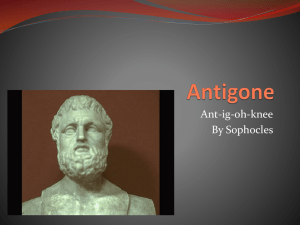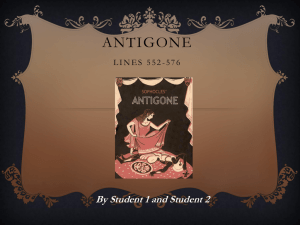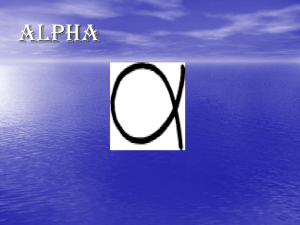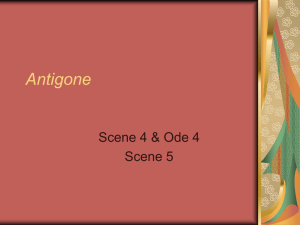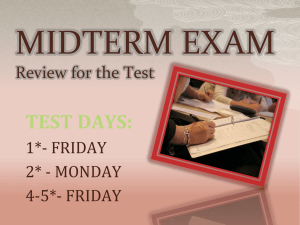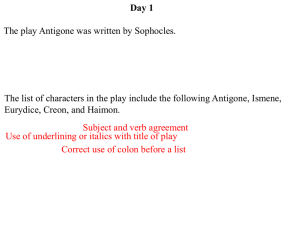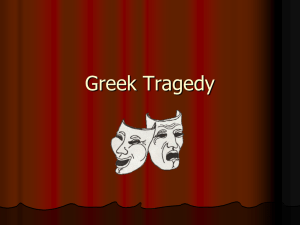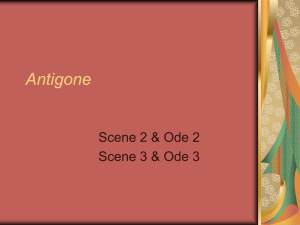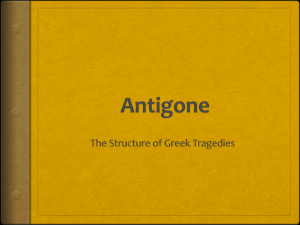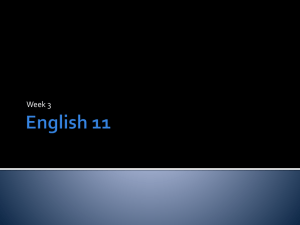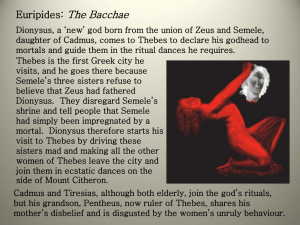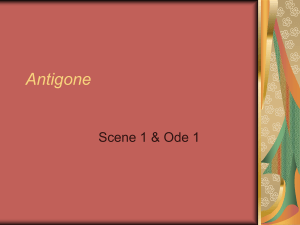Antigone - Mizz Parnaby`s Classes
advertisement
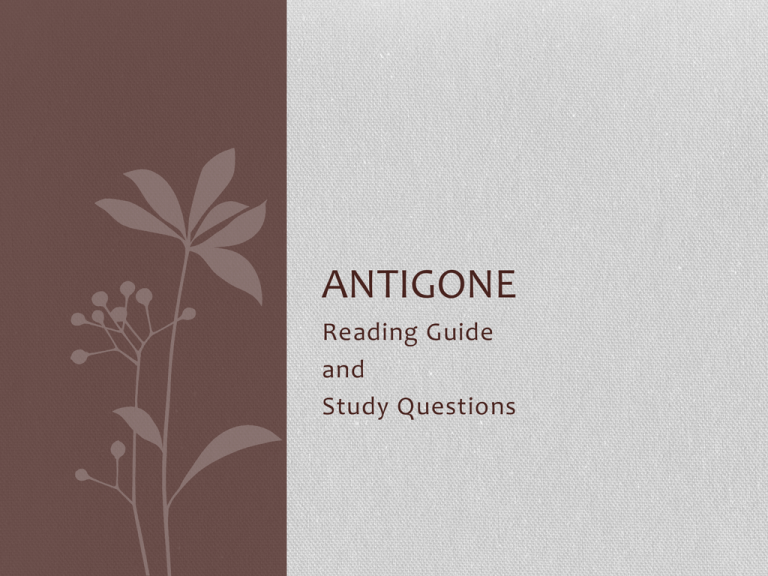
ANTIGONE Reading Guide and Study Questions Prologue • According to Ismene, what is the role of women; i.e., how should women behave? • Do you sympathize at all with Ismene’s caution, and does Antigone treat her fairly? • What is a martyr, and why does Antigone see herself as one? Parados (scene 1) The Chorus emerges from behind the scenes for their first choral ode, which concerns the previous night’s battle. • In the simplest terms, outline what happened in the battle between the brothers. • Contrast the two pictures of Polynices drawn here: the chorus’s version, and Antigone’s. Does your opinion of him, and of Antigone’s position, change at all? Episode 1 Creon emerges and expounds on the situation. • Cite lines where Creon explains the kind of wise ruler he intends to be. How does he view the laws of the state? • Compare Creon’s tone during his speech to the chorus and his tone when the Sentry appears. How does this differ, and what does this say about him? • The Sentry states, “. . . Nothing bad can happen that isn’t on one’s ticket.” What does this mean? (in another translation, it states: “. . . I came seized by one hope, to suffer nothing but my fated doom.”) Episode 1 cont’d. • Creon believes he knows what is or isn’t important to the gods. Cite lines that show what he thinks he knows. • What does Creon believe really happened to Polynices’ body? According to him, how was someone able to bury the body? First Stasimon / Ode 1 • What image of man does this ode present? In this vision, what is human greatness? What are the limits of human ability and action? When can a daring man get into trouble? • Choral odes often generalize a given problem specific to the play’s action into a statement about human life as a whole. Is that the case here? If so, then is the chorus alluding to Antigone, Creon, or both? What is your evidence? • Note that Creon consistently uses metaphors and images which link him with these skills and with civilization in general. On the other hand, Antigone and the resistance to Creon’s edict is generally represented by images connected with nature. Why do you think that Sophocles organized his imagery in this way? What meaning does this organization of imagery suggest for the play as a whole? Episode 2 • Why is Creon so surprised when the Sentry/Guard/Sentinel brings in Antigone? • Explain the comparison between Antigone and a bird. How is this an accurate comparison? • Ismene defends Antigone and asks Creon how he could kill his own son’s bride. What is the purpose of this relationship being revealed? • There are several comments about gender in this scene. What is the significance of them What do they show about Greek life? Mark any further examples in your text. • Antigone makes a comment regarding dictatorship. What is it? Make note of other thoughts on leadership and politics as you read the play. Draw a conclusion about Sophocles’ view of politics and Greek society. Second Stasimon / Ode 2 • Contrast this stasimon with the previous one. Is this ode’s thought and tone similar or different? What, if anything, has changed? Episode 3 • Compare the Creon in this scene with the one who first entered the play. How has he changed in language or conduct? • To what does Haemon appeal in his attempt to save Antigone, and how effective is it? • Does Haemon threaten his father as Creon thinks he does? Explain how this happens. • What is Creon’s rationale for choosing this particular method of execution? What does this say about him? Third Stasimon / Ode 3 • The ancient Greeks had two words for love: philia, meaning something like “friendship,” and eros, which has more to do with passion. When the chorus talks about love in the ode, which of the two loves do they mean? Why is the chorus generalizing about love here? • What is the main theme of this brief ode to Love? Since choral odes generally comment upon the action of the previous episode, explain what connection this song has with the preceding scene. What is the lesson for Creon in this ode? Episode 4 • How would you characterize the chorus’ exchange with Antigone here? • Does Antigone’s tone change at all during this episode, or does she remain completely self-assured and defiant? Give examples to support your opinion. Fourth Stasimon / Ode 4 • The chorus sings an ode about well-known figures of the past who were also forced to endure cruel punishments. Explain at least two of these myths and how they correspond with Antigone’s fate. Fourth Stasimon / Ode 4 (cont’d.) • The fourth stasimon presents three mythical examples which comment upon Antigone’s situation. What do the first two mythical personages Danae and Lycurgus (the son or Dryas), have in common with Antigone? The third example, Cleopatra, may have also shared the same characteristic with Antigone, but it is not mentioned. According to C.M. Bowra (Sophoclean Tragedy, Oxford, 1944, 105), these examples may indicate the doubts the Chorus has with Antigone. The Chorus has been alarmed by her defiant behavior, but it also has been impressed by her heroism. Bowra writes, “The three stories seem to suggest different interpretations of what is happening and to hint that any one of them may be right.” Examine each example carefully and determine whether it puts Antigone in a favorable or unfavorable light. Episode 5 • What is Teiresias’ warning? • Specifically, what in Teiresias’ warnings leads Creon to change his mind? Fifth Stasimon / Ode 5 / hyporchema • Why in the hyporchema* does the Chorus choose to pray to Dionysus at this critical moment rather than to any other god? What request does it make of the god? • *an unusual feature of Antigone is the substitution of a lively dance song called a hyporchema for the more stately rhythms of what would have been the fifth stasimon. The optimistic tone of the hyporchema has been occasioned by Creon’s change of heart and is meant to emphasize by contrast the horror of Antigone’s death and Creon’s misfortune in the next scene. Exodos • Why does Antigone choose to commit suicide? Aren’t there options? • What is Haemon’s reaction to this event? • Creon’s wife in only onstage momentarily, yet she plays a key role in Creon’s disaster. What does her suicide mean to him ? Why would Sophocles bother including this? • The leader of the chorus (the Choragos) has the last lines of the play. In your own words, what is his message?
